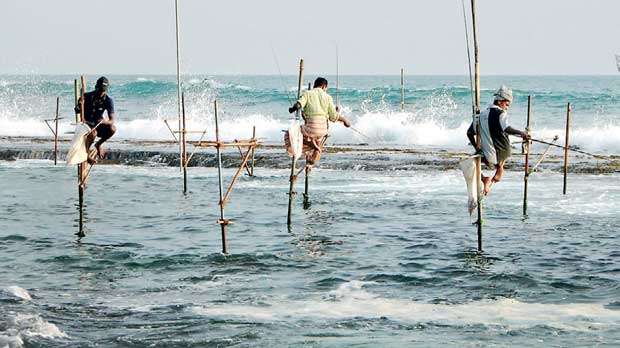Reply To:
Name - Reply Comment
Last Updated : 2024-04-19 21:20:00

 Oceans cover two thirds of world’s surface, and over 7.6 billion people directly or indirectly benefit from oceans around the world. Global fishery production is ever expanding, and according to the Food and Agriculture Organization (FAO), fisheries and aquaculture assure the livelihoods of 10-12 percent of the world’s population.
Oceans cover two thirds of world’s surface, and over 7.6 billion people directly or indirectly benefit from oceans around the world. Global fishery production is ever expanding, and according to the Food and Agriculture Organization (FAO), fisheries and aquaculture assure the livelihoods of 10-12 percent of the world’s population.
Ocean resources can boost the growth of a country’s economy, but human activity also takes a toll on ocean health. Therefore, fishing needs to be carried out at sustainable levels, or fish stocks will deteriorate from overfishing and collapse. According to the World Wildlife Federation, if the world keeps fishing at its current pace, there will be no more fish left to eat by 2048.
Sri Lanka is no exception to these statistics. One third of the population is living in the coastal belt, and many livelihoods are dependent on fishing. According to the Sri Lanka Export Board, the fisheries sector has generated approximately 2.4 million direct or indirect jobs for Sri Lankans. As per the Centre for Environmental Justice, fish is the source of protein for 2.5 million people living in coastal communities, and it provides more than 50 percent of the country’s animal protein requirement.
According to the 2016 Central Bank report, the fishing industry generates 1.6 percent of the Gross National Income. With a dependence on fish products for protein and a growing population, demand for fish is great in Sri Lanka as well. But even though it is necessary to expand the country’s fishing industry, it needs to be carried out at sustainable levels and with healthy practices.
Sri Lanka and its bodies of water
Sri Lanka is an island nation in the Indian Ocean, and the surrounding waters provide it with ample access to a vast variety of ocean resources.
Many landlocked nations depend on countries like Sri Lanka for marine resources including fish, ornamental fish, and seaweeds. With the lifting of the European Union ban on Sri Lankan fish exports, seafood exports to the EU have expanded significantly.
According to the Central Bank report, fish exports to the EU increased by 23.1 percent to a total of 2,540 metric tons in 2016. There is a great demand for Sri Lankan seafood and Tuna in the US, Japan, and the EU. Apart from fish for consumption purposes, global demand for Sri Lankan ornamental fish is also high in the US, Japan, and EU markets.
According to the United Nations Convention on the Law of the Sea (UNCLOS), Sri Lanka has territorial waters extending 12 nautical miles (nm) beyond the coastline, covering an area of about 21,500 sq km. Additionally, Sri Lanka controls another band of water called the contiguous zone, which extends up to 24 nm from the end of the territorial. In addition, the country enjoys rights to an ‘Exclusive Economic Zone’ (EEZ) that extends up to 200 nm from Sri Lanka’s shores and encompasses an area of about 510,000 sq km. Therefore, Sri Lanka has right to a body of water and its resources that is approximately seven times as large as the island’s landmass. Apart from those external water bodies, Sri Lanka also has 2905 km2 of inland water bodies. Given the enormity of both internal and external water resources, Sri Lanka is a country with high potential to be self-sufficient in seafood as well as to expand its export market.
Threats to Sri Lanka’s fishing industry
On one hand, Sri Lanka is not taking full advantage of its territorial waters to boost the economy; on the other hand, the current fishing industry is full of malpractices that destroy its own future. Fish stocks are affected by illicit fishing and illegal fishing methods, including banned nets, pair trawling, spear fishing, and dynamite fishing.
Pair trawling or bottom trawling sweeps the entire ocean bed, thereby destroying the ecosystems, eggs, and breeding grounds of fish. This method catches not only the expected fish but also corals and marine life inhabiting the corals. The resulting bycatch is often wasted, resulting in imbalances in the ecosystem and rendering the entire industry unsustainable.
In addition, spearfishing in Sri Lanka targets the grown coral fish and has thus become a major threat to the existence of some of the endangered coral fish. The existence of these grown coral fish is vital to the survival of the coral reefs, as the coral fish devour fish that eat corals. Therefore, the biological imbalance generated by spearfishing will deplete the corals.
Moreover, small scale fishermen also use traditional illegal fishing gear called Hambili, Laila, and Surukku which affect the livelihood of fishermen and have contributed significantly to reduce the fish catch. All these fishing nets destroy the rich marine resources while also posing a threat to the mangrove environment. As the eye of these nets are smaller, tiny fish are also getting caught, which deprives bigger fish of food and thereby posing a threat to the sustainability. Dynamite fishing is another menace to the sustainability of the fishing industry. Dynamite is thrown at an identified fish school, resulting in stunned and dead fish floating to the top where they can easily be caught. This dynamite fish is not good for consumption, as it contains explosives and has been in contaminated water for a considerable time, and instead poses a threat to corals and other marine species.
Besides these unsustainable fishing methods, poor fisheries management and large scale post-harvest losses due to poor handling are the major barriers on the way forward for Sri Lanka. Approximately 25 percent of the catch is wasted in the storage process of Sri Lanka due to unavailability of proper storage facilities in the fishing fleets as well as the ports.
Solutions for a healthy catch
For Sri Lanka, the proper handling of the catch as well as adequate storage facilities are vital in harnessing the full potential of the industry. The Fisheries Ministry should provide proper facilities to the fishermen, including harbour and storage facilities. Improved roads and infrastructure also ensure the transportation of fresh fish with minimum wastage. Technical know-how on proper fish packing procedures will also improve the quality of the fish and make them feasible for the export market.
The Fisheries Ministry should introduce new regulatory mechanisms for fishing methods and gear and enforce new regulations when issuing licenses to fishermen. Moreover, the government should ban bottom trawling and patrol Indian fishermen entering the waters of Sri Lanka, as their method of pair trawling destroys the sea bed. The Fisheries Ministry along with the National Aquatic Resources Research and Development Agency banned the Laila and Surukku nets in 2016. Providing fishermen with environmental-friendly nets with larger rings would be a bold step towards protecting the oceans. However, there is still a regulation under the Fisheries and Aquatic Resources Act that allows bottom trawling.
Eventhough an amendment to the fisheries and aquatic resources bill was tabled in Parliament to ban bottom trawling and dynamite fishing, it has not been implemented so far. The government needs to ban bottom trawling immediately to save the diminishing ocean resources.
Moreover, the government should also introduce methods to reduce the bycatch or the catch of untargeted fish caught in the nets and dragged along for miles, as most of the fish simply die before reaching the shore. In addition, the Government should close certain areas for fishing to allow the damaged marine resources to recover.
Hence, for a sustainable fishing industry, several factors are essential, including a conducive environment, the availability of coral reefs, sand bars, and unpolluted internal and external water bodies to provide breeding grounds for marine species. It is the responsibility of everyone, not only fishermen, to protect ocean habitats and marine life to ensure that marine resources will still be available for future generations.
(Buddhika Ranadheera works as research and programme officer at SLYCAN Trust. She focuses on climate change, sustainable development, gender and peace building. Buddhika has a BA (special degree) in English, and a Masters degree in International Relations from University of Colombo)

Add comment
Comments will be edited (grammar, spelling and slang) and authorized at the discretion of Daily Mirror online. The website also has the right not to publish selected comments.
Reply To:
Name - Reply Comment
On March 26, a couple arriving from Thailand was arrested with 88 live animal
According to villagers from Naula-Moragolla out of 105 families 80 can afford
Is the situation in Sri Lanka so grim that locals harbour hope that they coul
A recent post on social media revealed that three purple-faced langurs near t